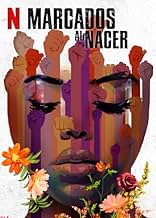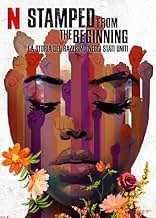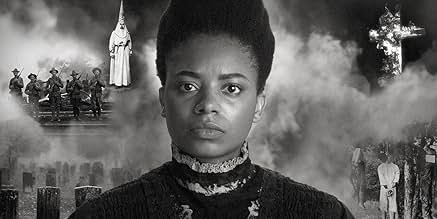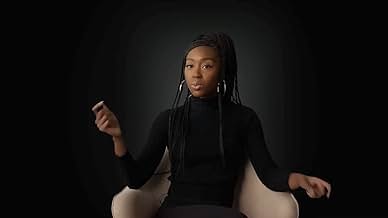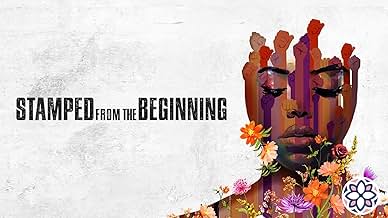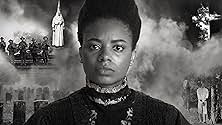ÉVALUATION IMDb
6,7/10
1,5 k
MA NOTE
Jalonné d'animations innovantes et d'avis d'experts, ce documentaire inspiré du best-seller lauréat de plusieurs prix explore l'histoire des idées racistes aux États-Unis.Jalonné d'animations innovantes et d'avis d'experts, ce documentaire inspiré du best-seller lauréat de plusieurs prix explore l'histoire des idées racistes aux États-Unis.Jalonné d'animations innovantes et d'avis d'experts, ce documentaire inspiré du best-seller lauréat de plusieurs prix explore l'histoire des idées racistes aux États-Unis.
- Nommé pour 1 prix Primetime Emmy
- 2 victoires et 10 nominations au total
Leer Leary
- Abraham Lincoln
- (voice)
David Goldstein
- Boston Elite
- (voice)
Avis en vedette
I rarely if ever post on this platform, but this one really went on my nerves. The perception provided in this documentary is great. The information you get is educational and at times mind blowing (especially for those ill-informed of USA history).
However, the production, editing, scene cutting, jumping from animation to another and then leaving viewers longing with the animated scenery mixed with some modern songs that just do not sit right is something that diminished the very purpose of this ever so important narrative. It is almost impossible to endure such editorial horror without some skips. I think it requires more formal and serious approach corresponding to the knowledge of acting narrators and topic itself.
However, the production, editing, scene cutting, jumping from animation to another and then leaving viewers longing with the animated scenery mixed with some modern songs that just do not sit right is something that diminished the very purpose of this ever so important narrative. It is almost impossible to endure such editorial horror without some skips. I think it requires more formal and serious approach corresponding to the knowledge of acting narrators and topic itself.
First off, the 'Half-Truths' review said that the movie said that Portugal had the start of slave trade which is false but the movie actually said it was that it (to the person) was the start of the TRANS-ATLANTIC slave trade.
Anyway, the actual movie is actually pretty good. It brought up points and information that (at least to me) made me want to look into the topic even further.
However, the editing was a bit cluttered but the mix of animation, video and hard-hitting narration and photos of objects/pictures/cartoons of the time. Also the music was a nice mix of hip-hop, dramatic classical, etc....
In conclusion (yes I know I'm writing this like a high school essay, let me be), the movie is pretty amazing and you should at least give it a chance.
Anyway, the actual movie is actually pretty good. It brought up points and information that (at least to me) made me want to look into the topic even further.
However, the editing was a bit cluttered but the mix of animation, video and hard-hitting narration and photos of objects/pictures/cartoons of the time. Also the music was a nice mix of hip-hop, dramatic classical, etc....
In conclusion (yes I know I'm writing this like a high school essay, let me be), the movie is pretty amazing and you should at least give it a chance.
Must see for all to understand the real history of the United States and how it's wealth and European wealth is built on the backs and blood of Atlantic slave trade and colonization. The film is not complete but should inspire everyone esp young people to learn about institutions and systems that propagate injustice and oppression. Wars in Middle East, Africa, civil unrest, poverty, mass shootings, mass incarceration, migrant crisis etc can be better understood in light of racist doctrines and policies created by Europeans since the 16th century. Read about the Doctrine of Discovery and Age of Exploration.
I quite like Kendi's book, and when I saw this pop up on Netflix I clicked it instantly, looking forward to see a documentary visualize the content of the book in an engaging manner.
Sadly, it's honestly harder to follow than expected, even for someone who has read the book. Williams' direction led to extreme over-editing, and the lack of captions or context for what you are looking at in the montages leads to frequent confusion and annoyance.
To be clear, I understand the logic behind Williams' editing style--but it still doesn't work. What he was going for was to try to amplify the continuities of 17th century racism to racism today, which is fitting with Kendi's main thesis. But in terms of documentary style, it goes a little 'too extra' even to that end, mixing together speeches, films, historical footage, contemporary news footage, highly stylized reenactments... to the extent that at any given montage, you could go a solid three minutes not being sure what CENTURY the footage you're looking at is coming from, let alone decade, or whether it was real footage or fiction.
If you were an educator, and wanted to have a conversation about Kendi's ideas, but hadn't assigned the full book, should you show this to your class instead? No, absolutely not -- this documentary will be annoying and confusing if you aren't already familiar with Kendi's point, and honestly, even if you agree with Kendi's thesis you might even then find much to dislike.
For instance, consider the 7 minute sequence from about 11 minutes into the documentary to the 18 minute mark, on Bacon's rebellion. Could your students answer the following questions: -What century was Bacon's rebellion in?
-What was Bacon's rebellion about?
-What was the outcome of Bacon's rebellion?
No--because Bacon's rebellion is just an incident mentioned in support of the idea that whiteness was invented to prevent poor whites from allying with poor blacks. You might be able to follow the point the documentary is trying to make, but the result is that, unless you already know the example, you would completely lose sense of historical trajectory or continuity because the documentary tells you so little contextualized information.
Now you might say--oh they didn't have time to go into all this context on the example. But they used two minutes right after introducing Bacon's Rebellion to give a four-century spanning montage of depictions of racism... instead of giving almost any basic context about the example of Bacon's rebellion or its relevance to the argument.
A lot of the montages, for that matter, feel... conspiratorial? What I mean by this is that again, they're not really making articulated connections; they're not even naming the people in the photos, so either you 'get it' or you don't--but isn't the point of a documentary to make it so that people unfamiliar with the subject will understand? There's no names given when someone's face pops up on screen, and the faces and names go by so fast even someone highly educated is likely to be left wondering "wait who was that guy..?"
Basically, even in a classroom setting where you had already read Kendi's book... I honestly feel like this documentary would do more harm to comprehension than good.
Sadly, it's honestly harder to follow than expected, even for someone who has read the book. Williams' direction led to extreme over-editing, and the lack of captions or context for what you are looking at in the montages leads to frequent confusion and annoyance.
To be clear, I understand the logic behind Williams' editing style--but it still doesn't work. What he was going for was to try to amplify the continuities of 17th century racism to racism today, which is fitting with Kendi's main thesis. But in terms of documentary style, it goes a little 'too extra' even to that end, mixing together speeches, films, historical footage, contemporary news footage, highly stylized reenactments... to the extent that at any given montage, you could go a solid three minutes not being sure what CENTURY the footage you're looking at is coming from, let alone decade, or whether it was real footage or fiction.
If you were an educator, and wanted to have a conversation about Kendi's ideas, but hadn't assigned the full book, should you show this to your class instead? No, absolutely not -- this documentary will be annoying and confusing if you aren't already familiar with Kendi's point, and honestly, even if you agree with Kendi's thesis you might even then find much to dislike.
For instance, consider the 7 minute sequence from about 11 minutes into the documentary to the 18 minute mark, on Bacon's rebellion. Could your students answer the following questions: -What century was Bacon's rebellion in?
-What was Bacon's rebellion about?
-What was the outcome of Bacon's rebellion?
No--because Bacon's rebellion is just an incident mentioned in support of the idea that whiteness was invented to prevent poor whites from allying with poor blacks. You might be able to follow the point the documentary is trying to make, but the result is that, unless you already know the example, you would completely lose sense of historical trajectory or continuity because the documentary tells you so little contextualized information.
Now you might say--oh they didn't have time to go into all this context on the example. But they used two minutes right after introducing Bacon's Rebellion to give a four-century spanning montage of depictions of racism... instead of giving almost any basic context about the example of Bacon's rebellion or its relevance to the argument.
A lot of the montages, for that matter, feel... conspiratorial? What I mean by this is that again, they're not really making articulated connections; they're not even naming the people in the photos, so either you 'get it' or you don't--but isn't the point of a documentary to make it so that people unfamiliar with the subject will understand? There's no names given when someone's face pops up on screen, and the faces and names go by so fast even someone highly educated is likely to be left wondering "wait who was that guy..?"
Basically, even in a classroom setting where you had already read Kendi's book... I honestly feel like this documentary would do more harm to comprehension than good.
Beautiful, informative and eye-opening documentary.
Direction of the film was seamless and organized. Provided alot of background on system on being Black in America that is clear, understandable to other American citizens as well as Black non-Americans.
Perfectly explained and succinct with need to know facts.
The art and music direction was stellar with images that helped to narrate story.
The citations were my favourite part as it helped to push film along.
I wish there a bit more but I understand enough to reach everyone.
As any documentary, they achieved aim of sparking thought and starting conversations. Definitely will recommend to others.
Direction of the film was seamless and organized. Provided alot of background on system on being Black in America that is clear, understandable to other American citizens as well as Black non-Americans.
Perfectly explained and succinct with need to know facts.
The art and music direction was stellar with images that helped to narrate story.
The citations were my favourite part as it helped to push film along.
I wish there a bit more but I understand enough to reach everyone.
As any documentary, they achieved aim of sparking thought and starting conversations. Definitely will recommend to others.
Meilleurs choix
Connectez-vous pour évaluer et surveiller les recommandations personnalisées
- How long is Stamped from the Beginning?Propulsé par Alexa
Détails
- Date de sortie
- Pays d’origine
- Site officiel
- Langue
- Aussi connu sous le nom de
- Stamped from the Beginning
- Lieux de tournage
- sociétés de production
- Consultez plus de crédits d'entreprise sur IMDbPro
- Durée1 heure 31 minutes
- Couleur
- Mixage
Contribuer à cette page
Suggérer une modification ou ajouter du contenu manquant


